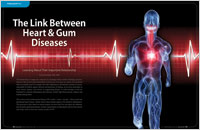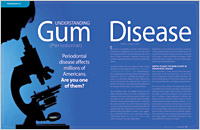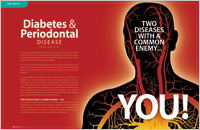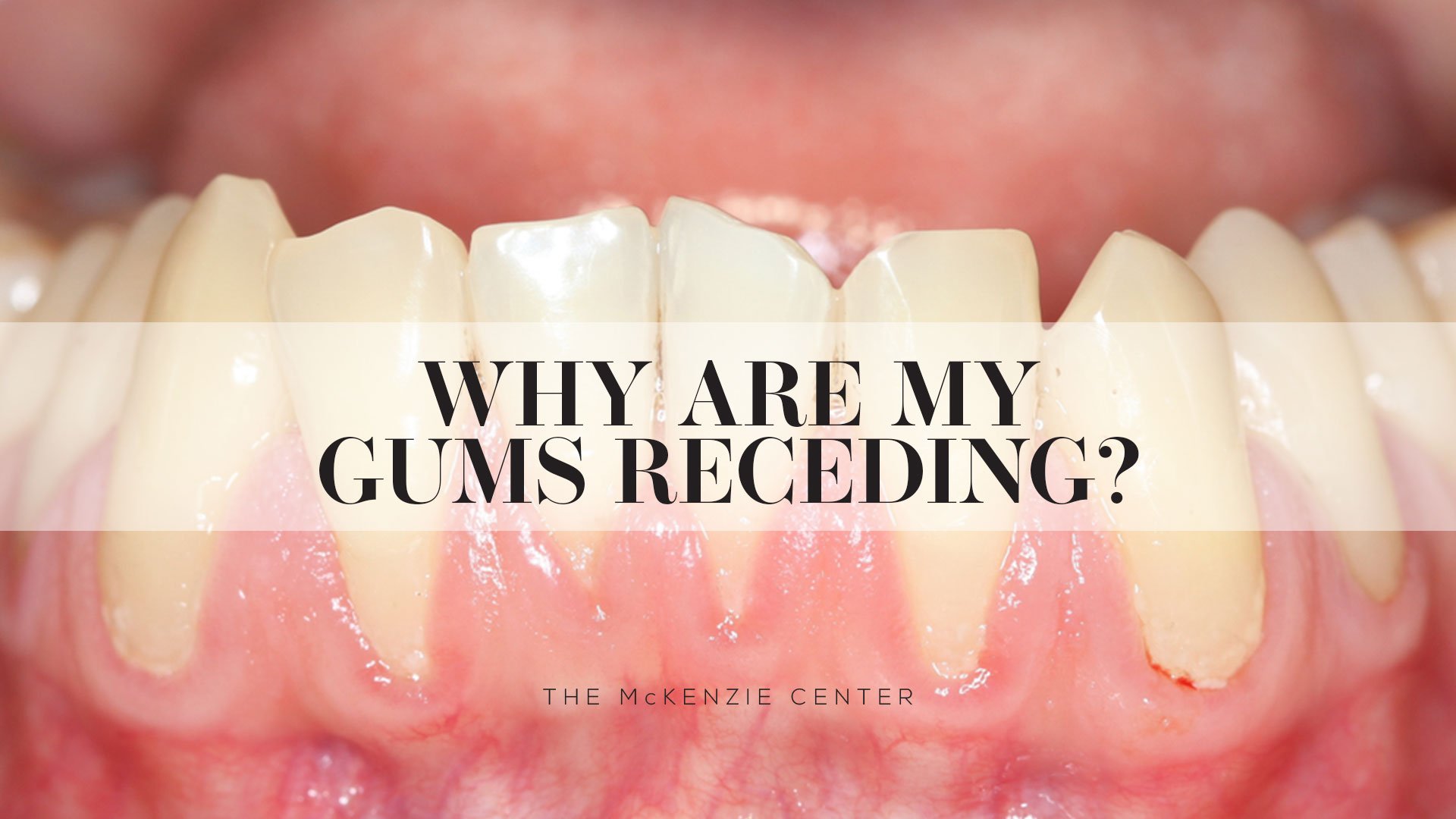If you look in the mirror and see your gums receding or pulling back, don't ignore it. With receding gums, you might notice your teeth look longer, because gum recession exposes more of the base of your teeth. Plus, you might also notice other symptoms like:
• Bleeding gums when you brush or floss
• Swollen gums
• Bad breath
• Darkening or reddening of gum tissue
• Gum tenderness
• Loose or shifting teeth
• Changes in your bite or the way your teeth fit together.
The most common cause of receding gums is periodontal disease, or "gum disease." Statistics show most adults over thirty have some periodontal disease, and the incidence goes up with age. Gum disease occurs when plaque -- a sticky film of bacteria -- builds up on the bast of teeth and inflames the fibers that hold your gums in place. Without treatment, pockets form between your teeth that "hide" bacteria and make it harder for you to remove them when you brush.
In determining how significant a person's gum disease is, a dentist or periodontist, a specialist in periodontal disease, measures the depth of the pockets. Gum disease ranges in severity from mild to severe. In moderate to severe cases, gum inflammation spreads into the supporting ligaments that help hold your teeth in place or into the bone. At this stage, teeth can become loose, and you could experience tooth loss. Untreated periodontal disease is the most common cause of tooth loss.
Fortunately, there are treatments for gum recessions caused by periodontal disease that can help you save your teeth. In the initial stages, home hygiene measures may be sufficient, but in more advanced stages of periodontal disease you may need scaling and planing, a deep cleaning process that removes deeper plaque and pockets of bacteria and smooths the deeper surfaces of your teeth to make it harder for bacteria to stick to your teeth.
More advanced stages of periodontal disease may require surgery, including the placement of gum or bone grafts.
Other Causes of Receding Gums
Although periodontal disease tops the list of causes of receding gums, there are others. These include:
• Age (gums naturally recede with age)
• Brushing your teeth too hard
• Inadequate home dental care (improper brushing and flossing or inconsistent flossing and brushing).
• Not seeing a dentist regularly for deep cleanings to remove tartar
• Hormonal changes in women can also trigger gum recession
• Smoking (also a strong risk factor for periodontal disease)
• Genetics
Don't Ignore Receding Gums
The worst thing you can do is ignore receding gums. It's a problem that won't go away on its own, and it's likely to get worse without treatment. The biggest risk is that significant gum disease leads to bone and ligament involvement, followed by the loss of teeth.
The condition of your gums also affects your overall health. Studies correlate periodontal disease with a higher risk of heart attack, stroke, and type 2 diabetes. The underlying factor may be inflammation. When your gum tissues are inflamed, the inflammatory response may affect other tissues, including the inner walls of blood vessels. That's why it's important to maintain good dental hygiene practices and see your dentist every six months for a check-up and deep cleaning.
The Bottom Line
Receding gums is often a sign of underlying gum disease, although smoking and improper brushing can also cause gum recession. If you notice your gums are receding, see your dentist for an evaluation. If they suspect you have periodontal disease, they may refer you to a periodontist for further evaluation and treatment. Fortunately, there are treatments available that will help you enjoy a healthier smile.
References:
"Gum Disease Risk Factors - American Academy of Periodontology." perio.org/for-patients/gum-disease-information/gum-disease-risk-factors/.
"The health risks of gum disease - NHS." nhs.uk/live-well/healthy-body/health-risks-of-gum-disease/.
"Periodontal Disease | Oral Health Conditions | Division of ...." 30 Aug. 2012, cdc.gov/oralhealth/conditions/periodontal-disease.html.
Eke PI, Dye BA, Wei L, Thornton-Evans GO, Genco RJ. Prevalence of Periodontitis in Adults in the United States: 2009 and 2010. Journal of Dental Research. 2012;91(10):914-920. doi:10.1177/0022034512457373.
"How to Know If You Have Gum Disease and What to Do About It." webmd.com/oral-health/features/gums-problems-gingivitis.
"Gum disease and heart disease: The common thread - Harvard ...." 15 Feb. 2021, health.harvard.edu/heart-health/gum-disease-and-heart-disease-the-common-thread.
Related Periodontal (Gum) Disease Articles
 The Link Between Heart & Gum Diseases
The Link Between Heart & Gum Diseases
Inflammation has emerged as a factor that is involved in the process of Cardiovascular Disease (CVD), which commonly results in heart attacks and strokes. While the precise role inflammation plays in causing chronic CVD remains an area of intense current investigation, much more is now known. The good news is that, based on current research, we know that if we can reduce the inflammation caused by periodontal disease, we can reduce the risk for heart attacks and strokes...
Read Article
 Understanding Gum (Periodontal) Disease
Understanding Gum (Periodontal) Disease
Have your gums ever bled when you brushed or flossed? This most commonly overlooked simple sign may be the start of silent (periodontal) disease leading to tooth loss. Learn what you can do to prevent this problem and keep your teeth for life...
Read Article
 Diabetes & Periodontal Disease
Diabetes & Periodontal Disease
Diabetes and periodontal disease are chronic inflammatory diseases that impact the health of millions of people. What you may not know is that diabetes and periodontal disease can adversely affect each other...
Read Article
 Warning Signs of Periodontal (Gum) Disease
Warning Signs of Periodontal (Gum) Disease
This article provides the warning signs of periodontal (gum) disease. Don't wait until it's too late...
Read Article


